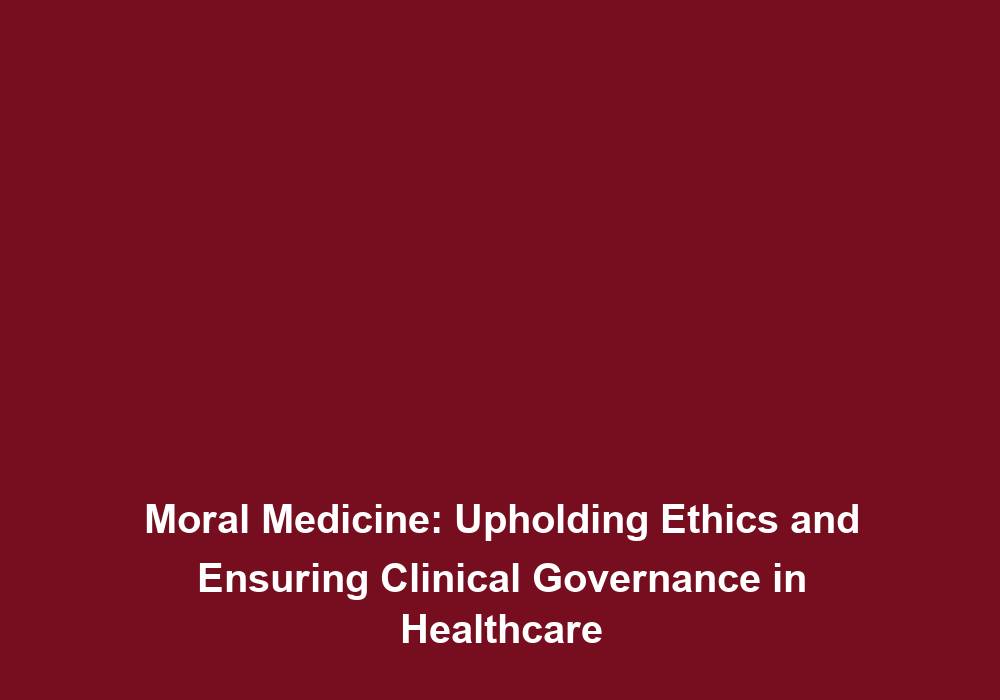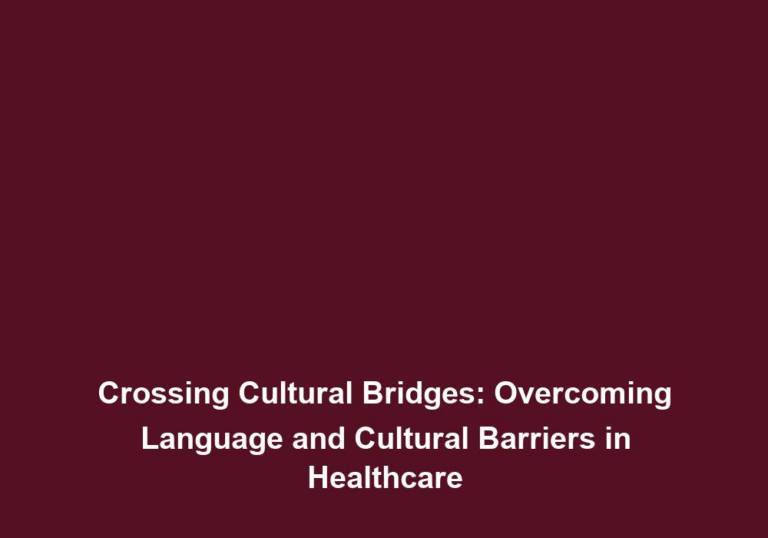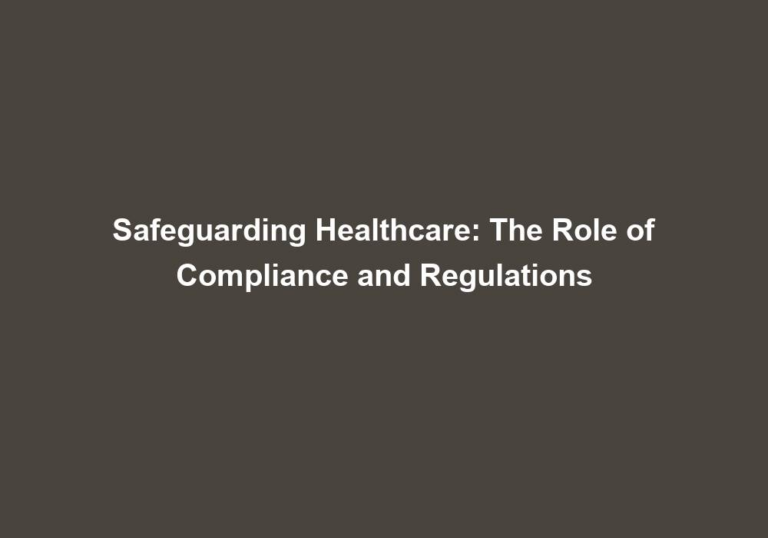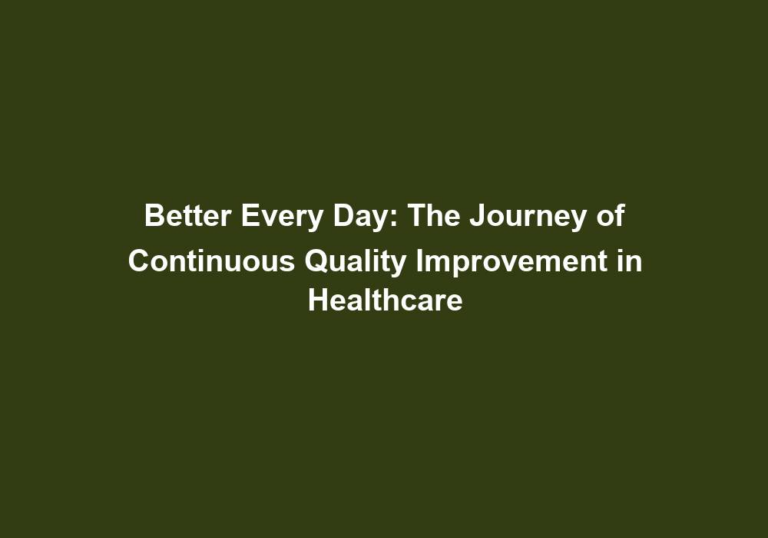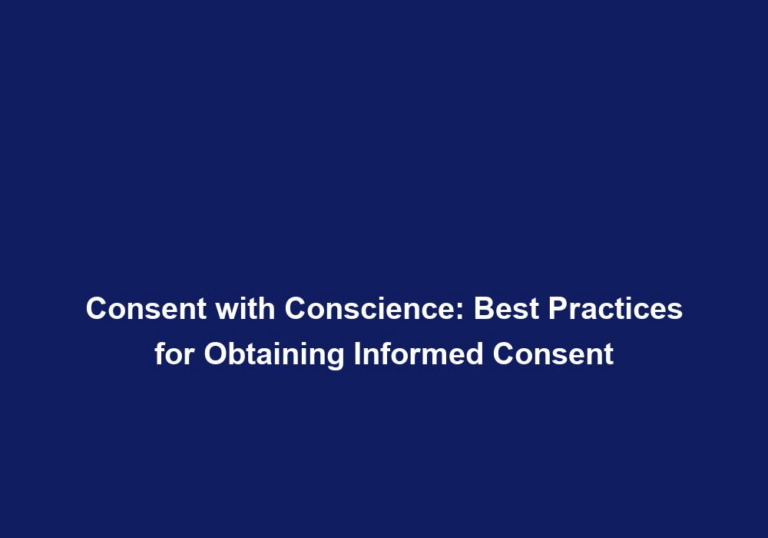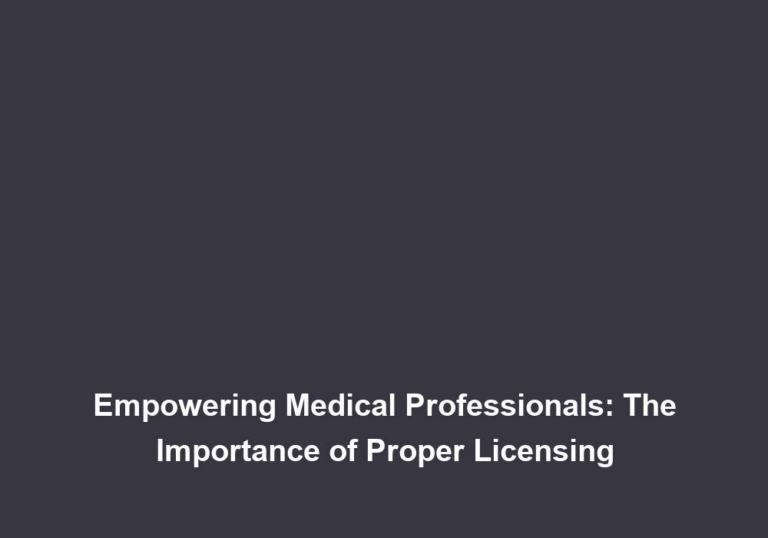Moral Medicine: Upholding Ethics and Ensuring Clinical Governance in Healthcare
In the ever-evolving field of healthcare, ethical considerations and clinical governance play an essential role in providing quality care and maintaining public trust. This article delves into the importance of moral medicine, highlighting the significance of upholding ethics and ensuring effective clinical governance within the healthcare system.
Understanding Ethics in Healthcare
Ethics in healthcare encompasses principles and values that guide medical professionals in making decisions and providing care. It involves moral reasoning and judgment, helping professionals navigate complex situations and dilemmas while upholding patient welfare as the top priority.
Ethics in healthcare is a fundamental aspect that ensures the provision of quality care and the protection of patient rights. It involves a set of principles and values that guide healthcare professionals in making decisions and providing care to patients. These ethical principles include autonomy, justice, beneficence, and non-maleficence. Autonomy refers to respecting patients’ rights to make decisions about their own healthcare. Justice ensures fair and equitable distribution of healthcare resources. Beneficence focuses on the promotion of well-being and doing what is in the best interest of the patient. Non-maleficence emphasizes the duty to do no harm to the patient.
The Role of Medical Ethics
Medical ethics provides a framework for healthcare professionals to make ethically sound choices. It helps in maintaining patient autonomy, justice, beneficence, and non-maleficence. These principles ensure that patients receive the best possible care while considering their values, preferences, and well-being.
Medical ethics is crucial in guiding healthcare professionals to make ethically sound choices. It provides a framework that helps professionals navigate complex situations and dilemmas while upholding patient welfare as the top priority. By adhering to ethical principles, healthcare professionals can ensure that patients’ rights are respected, and their well-being is prioritized.
Ethical Dilemmas in Healthcare
Healthcare professionals often face ethical dilemmas that require careful consideration and resolution. These dilemmas can arise when deciding on treatment options, allocating scarce resources, dealing with conflicts of interest, respecting patient confidentiality, or considering end-of-life decisions.
Ethical dilemmas in healthcare are complex situations that require healthcare professionals to make difficult decisions. These dilemmas can arise when there is a conflict between different ethical principles or when there is a scarcity of resources. For example, healthcare professionals may face a dilemma when deciding which patients should receive limited resources such as organ transplants. In such situations, healthcare professionals must consider the principles of justice, beneficence, and non-maleficence to make fair and ethically justified decisions.
Addressing these dilemmas requires a comprehensive understanding of ethical principles, open communication, and collaboration among healthcare teams. Ensuring ethical decision-making promotes trust, transparency, and a patient-centered approach to care.
Addressing ethical dilemmas in healthcare requires healthcare professionals to have a solid understanding of ethical principles and values. Open communication and collaboration among healthcare teams are essential in resolving these dilemmas and making ethically sound decisions. Engaging in ethical decision-making promotes trust between healthcare professionals and patients, and it ensures that patient welfare is always the top priority.
The Significance of Clinical Governance
Clinical governance is an essential aspect of healthcare systems worldwide. It involves a systematic approach to quality improvement, patient safety, and risk management. Clinical governance ensures that healthcare organizations adhere to recognized standards, guidelines, and protocols, while continuously monitoring and improving their services.
Clinical governance plays a crucial role in ensuring the provision of safe and high-quality healthcare services. It involves a systematic approach to quality improvement, patient safety, and risk management. Healthcare organizations that implement clinical governance frameworks can effectively monitor and enhance the quality of their services by adhering to recognized standards, guidelines, and protocols.
Pillars of Clinical Governance
Clinical governance is built upon several pillars, ensuring the delivery of safe and effective care:
- Clinical Audit: Regular audits monitor the quality of healthcare services, allowing for continuous improvement. These audits assess adherence to guidelines, identify areas needing improvement, and implement necessary changes.
Clinical audit is a vital component of clinical governance that involves the systematic review and evaluation of healthcare services. Regular audits help identify areas where improvement is needed, ensuring that healthcare organizations provide high-quality care that aligns with established guidelines and protocols. The findings from clinical audits drive continuous improvement initiatives and allow for the implementation of necessary changes to enhance patient outcomes.
- Education and Training: Continuous education and training programs equip healthcare professionals with the knowledge and skills needed to provide high-quality care and stay updated with advances in medical technology.
Continuous education and training programs play a significant role in clinical governance by ensuring that healthcare professionals have the necessary knowledge and skills to provide high-quality care. These programs help healthcare professionals stay updated with the latest advancements in medical technology and best practices. By investing in education and training, healthcare organizations can enhance the competence and capabilities of their workforce, ultimately improving patient outcomes.
- Risk Management: Effective risk management strategies identify potential risks, implement preventive measures, and manage adverse events. This ensures patient safety, reduces errors, and enhances overall quality of care.
Risk management is a critical aspect of clinical governance that aims to identify and mitigate potential risks in healthcare settings. It involves implementing preventive measures to minimize the occurrence of adverse events and managing any adverse events that do occur. By effectively managing risks, healthcare organizations can ensure patient safety, reduce errors, and enhance the overall quality of care provided.
- Clinical Effectiveness: Healthcare organizations strive to provide evidence-based care that is both effective and efficient. By implementing clinical guidelines and protocols, organizations can ensure that treatments and interventions are based on the best available evidence.
Clinical effectiveness is a key focus of clinical governance, with healthcare organizations aiming to provide evidence-based care. This involves implementing clinical guidelines and protocols that are based on the best available evidence. By following these guidelines and protocols, healthcare professionals can ensure that treatments and interventions are effective and efficient, leading to improved patient outcomes.
- Patient and Public Involvement: Involving patients and the public in decision-making processes promotes transparency, accountability, and patient-centered care. Engaging patients in their own care empowers them and enables shared decision-making.
Patient and public involvement is crucial in clinical governance as it promotes transparency, accountability, and patient-centered care. By involving patients and the public in decision-making processes, healthcare organizations can ensure that the perspectives and preferences of patients are considered. This empowers patients, enables shared decision-making, and ultimately leads to improved patient experiences and outcomes.
Benefits of Clinical Governance
Effective implementation of clinical governance offers numerous benefits:
- Improved patient outcomes and safety through adherence to guidelines and protocols.
- Increased accountability and transparency within healthcare organizations.
- Enhanced quality of care through continuous improvement initiatives.
- Minimized risks and adverse events through robust risk management processes.
- Efficient use of resources, leading to cost savings without compromising quality.
Clinical governance brings about a range of benefits that contribute to the delivery of high-quality healthcare services. By adhering to guidelines and protocols, healthcare organizations can improve patient outcomes and safety. The implementation of clinical governance frameworks also enhances accountability and transparency within healthcare organizations, ensuring that they operate in an ethical and responsible manner. Continuous improvement initiatives driven by clinical governance lead to enhanced quality of care, while robust risk management processes minimize risks and adverse events. Additionally, clinical governance promotes the efficient use of resources, resulting in cost savings without compromising the quality of care provided.
Ethical Considerations in Clinical Governance
Ethics and clinical governance are closely intertwined, as both aim to ensure patient welfare and maintain ethical standards. Ethical considerations guide the implementation and evaluation of clinical governance practices.
Ethical considerations are an integral part of clinical governance, as they guide the implementation and evaluation of practices within healthcare organizations. By considering ethical principles and values, healthcare organizations can ensure that their clinical governance frameworks prioritize patient welfare and maintain the highest ethical standards.
Protecting Patient Confidentiality
Patient confidentiality is a fundamental ethical principle in healthcare. Clinical governance practices must include measures to safeguard patient information and ensure its confidentiality. This involves secure record-keeping systems, data protection policies, and strict adherence to privacy regulations.
Protecting patient confidentiality is of utmost importance within clinical governance. Healthcare organizations must implement measures to safeguard patient information and ensure its confidentiality. This includes the use of secure record-keeping systems, the development of data protection policies, and strict adherence to privacy regulations. By prioritizing patient confidentiality, healthcare organizations can maintain trust and respect patients’ rights to privacy.
Ensuring Informed Consent
Respecting patient autonomy and obtaining informed consent is crucial for ethical healthcare practices. Clinical governance frameworks should emphasize clear communication, informed decision-making, and obtaining consent before any procedure or treatment.
Ensuring informed consent is a fundamental ethical consideration in clinical governance. Healthcare organizations should emphasize the importance of clear communication, informed decision-making, and obtaining consent from patients before any procedure or treatment. By prioritizing informed consent, healthcare organizations can respect patient autonomy and ensure that patients have the necessary information to make decisions about their own healthcare.
Addressing Conflicts of Interest
Conflicts of interest can undermine the integrity of healthcare decisions. Clinical governance protocols should include guidelines for identifying and addressing conflicts of interest, ensuring that patients’ best interests always come first.
Addressing conflicts of interest is crucial within clinical governance to ensure that healthcare decisions are made in the best interest of patients. Clinical governance protocols should include clear guidelines for identifying and managing conflicts of interest among healthcare professionals. By prioritizing patients’ best interests, healthcare organizations can maintain the integrity of healthcare decisions and ensure that they are not influenced by personal or financial interests.
Ethical Use of Data
The use of patient data for research and quality improvement is essential but must be conducted ethically. Clinical governance frameworks should outline guidelines for the ethical use of data, ensuring patient privacy, informed consent, and protection against data misuse.
Ethical use of data is a critical consideration within clinical governance frameworks. While the use of patient data for research and quality improvement is essential, it must be conducted in an ethical manner. Clinical governance frameworks should outline clear guidelines for the ethical use of data, ensuring that patient privacy is protected, informed consent is obtained, and measures are in place to prevent data misuse. By upholding ethical standards in data use, healthcare organizations can maintain patient trust and ensure the responsible handling of sensitive information.
Conclusion
In the realm of healthcare, moral medicine, ethical considerations, and effective clinical governance are essential for providing high-quality care and maintaining public trust. Upholding ethical principles and integrating clinical governance practices into healthcare systems ensures patient welfare, promotes transparency, accountability, and continuous improvement. By adhering to these principles, healthcare professionals can navigate ethical dilemmas, deliver safe and effective care, and shape a healthcare system that operates ethically and with the utmost integrity.

